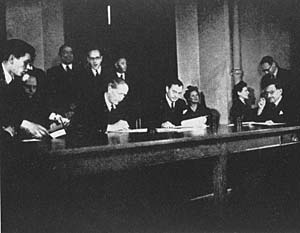The London Conference
and the
Agreement of London

Robert H. Jackson made a preliminary visit to London in late May 1945 where he conferred with Foreign Minister, Anthony Eden, and British Attorney General, David Maxwell Fyfe. These meetings, ultimately, helped to show that there was no significant difference between the American and British goals for the trials. However, before meeting with the British the American delegation felt that they would have a difficult time in convincing opponents that the American plan for holding a trial, rather than executing the war criminals, would be the best option. They expected to have the greatest difficultly with the British because they would naturally want to assume the leadership role in the trial.
On Monday, June 18, 1945 Jackson, and seventeen members of his staff including Major General William J. Donovan, the director of the O.S.S., and Ensign William E. Jackson, Justice Jackson’s son, departed to begin negotiations for a charter with the British, French, and Russians in London. On June 21 representatives from the United States and Britain met on an informal basis to exchange information. The representative from the British Foreign Office, Sir Basil Newton, informed the American delegation that the government had accepted the invitation to the conference and would arrive on June 25. The British and Americans agreed that the trial should be held on the Continent, probably in Germany in either the American or British zone. Sir David suggested that it be held in Munich but Justice Jackson pointed out that the location would depend on availability of facilities. At a second meeting on June 24 Sir Basil Newton informed both delegations that the Russians had accepted the invitation but had asked for the first official meeting to be delayed until June 26. Throughout the negotiations the Americans and the Russians would almost continually be at odds with each other.
The British delegation consisted of Sir David Maxwell Fyfe, Sir Thomas Barnes, the Treasurer-Solicitor and Patrick dean, of the British Foreign Office. The French delegation consisted of Judge Robert Falco and Professor André Gros. General I.T. Nikitchenko and Professor Trainin made up the Russian delegation.
The Anglo-American system of law differed considerably from the continental system that the French and the Russians used. The first point of contention was over the function of the indictment. In Anglo-American law this is the statement of charges against a criminal to inform him of the crime he is being charged with. In the Soviet system the indictment includes all of the evidence that will be utilized during the trial. In this case the Americans won. A second point of disagreement between the Americans and the Russians was whether organizations, such as the SS and the Gestapo, could be tried as criminal entities. The Russians said no and the Americans said yes. Giving the Americans the responsibility for proving this portion of the case solved this problem. Conflicts also arose in regards to the definition of international law and what constituted both international law and the laws of a sovereign nation. The negotiating countries faced many disagreements of this nature. Adjourning the conference, preparing new amendments and then debating these amendments at the next session helped to solve each problem but on many major points of contention the American delegation overrode opposition from the other nations.
Throughout the negotiations Justice Jackson attempted to keep an open mind, which probably eased tensions, but the Agreement of London basically created a system that the Americans approved of and the other nations went along with. The negotiators ran into many points of disagreement but in the end, Justice Jackson and his British, French, and Russian counterparts were able to overcome differences in judicial practice to form the tribunal.
On August 8, 1945 the participating nations gathered to sign the Agreement and Charter for the Prosecution and Punishment of Major War Criminals of the European Axis, or the Agreement of London. The process of creating this charter had taken two months of negotiation but succeeded in establishing a system that all four nations would accept as dispensing justice.
The final London Agreement created the system on which the surviving Nazi leaders and Nazi criminal organizations would be tried. The defendants could be charged with traditional war crimes, crimes against humanity, and crimes against peace. In addition, they could be tried for having participated in a common plan or conspiracy to commit war.
For full text of the Charter
Web page by Amy Suelzle
Revised 12/9/02